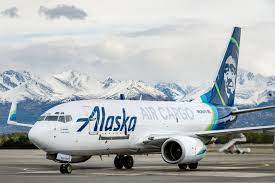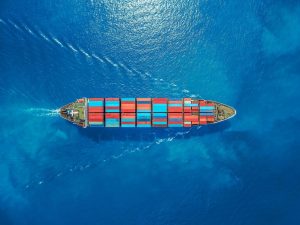The French Minister for Transport, Jean-Baptiste Djebbari, visited Jawaharlal Nehru Port Authority (JNPA) on Sunday to discuss and strengthen Indo-French relations and sustainable solutions for land, air, and sea transport. The French Minister also discussed the contribution of French companies in developing Indian ports and logistics value chains, along with the execution of the joint master plan on the blue economy, with Shri Unmesh Shard Wagh, IRS, Dy. Chairman, JNPA. While interacting with the French minister and delegates, Wagh said, “JNPA promotes and emphasises sustainable solutions and land and sea transport systems, enabling meaningful participation in social and economic activities. JNPA provides multi-modal facilities and several projects that enable ease of operation and give the finest experience to our customers and stakeholders.” Speaking about Indo-French relations, he added, “India and France are interested in progressive advancement in the maritime domain and port sector and are also both enthusiastic trading partners.” An exclusive presentation of projects at JNPA was also showcased at the event, followed by a port visit. The French minister appreciated JNPA’s green port initiatives and the steps taken towards sustainable development.
Read More »EV Cargo acquires Fast Forward Freight, seeks growth
EV Cargo has acquired Netherlands-headquartered Fast Forward Freight in a move that will more than double the firm’s annual airfreight volumes, says the release. The company, owned by Hong Kong-based private equity firm EmergeVest, said that the acquisition is part of its previously announced corporate strategy to expand its worldwide footprint and grow its freight forwarding and supply chain services business. As part of the transaction, EV Cargo has become the sole shareholder of Fast Forward Freight (and its trading subsidiaries), with the current owners of Fast Forward Freight becoming shareholders of EV Cargo. The deal adds more than $170m of revenue to EV Cargo, resulting in pro forma combined revenue of approximately $1.7bn, and grows EV Cargo’s employees to more than 2,600 globally, tripling its European workforce to more than 400 people. In terms of airfreight, the move will more than double EV Cargo’s volumes to over 100,000 tonnes. In terms of locations, EV Cargo will “significantly” increase its presence in the Netherlands, Belgium, France, Germany, and UK, as well as expand into Greece and Switzerland. Fast Forward Freight will be rebranded as EV Cargo and operations will merge. Heath Zarin, Founder and Chief Executive of EV Cargo, said in a statement, “Fast Forward Freight shares our commitment to providing innovative technology-enabled solutions and has a strong history of providing supply chain control towers to its customer base of world-leading brands. This transaction helps us grow the EV Cargo global network by adding excellent colleagues, capabilities, and customers.” Fast Forward Freight founder and chief executive, Marc Terpstra, added, “EV Cargo is focused on providing an innovative technology platform, blending proprietary and industry leading technology based on a deep understanding …
Read More »Alaska Air Cargo expands freighter fleet with addition of two aircraft
Alaska Air Cargo is all set to expand with the addition of two Boeing 737-800 aircraft to its dedicated freighter fleet serving the state of Alaska. These additions increase the freighter fleet from three to five aircraft. “Fleet expansion positions our growing cargo business to meet increased demand that we see from industry and consumers,” said Adam Drouhard, Managing Director for Alaska Air Cargo, in an official statement. Air Cargo’s total freighter lift capacity will be essentially doubled with the introduction of the -800 aircraft. “We look forward to getting these -800s into service to support Alaska’s supply chain and connect cargo to over 100 cities we serve across North America,” he added. The two 737-800 converted aircraft will come from Alaska Airlines’ existing passenger fleet. Beginning this year, the planes will be converted from their passenger configuration to all-freight aircraft. They’re projected to re-enter service as freighters in 2023. The -800 aircraft provides a 40% capacity increase per departure over the current -700 aircraft, with a payload of nearly 50,000 pounds. With a range of 2,800 nautical miles, the -800 will be the most fuel-efficient aircraft to serve intra-Alaska. “Alaskans have always relied on Alaska Air Cargo to provide time-sensitive services to their communities,” said Marilyn Romano, Regional Vice President, Alaska Airlines. “Whether it is vaccines, medicine, household supplies or fresh food, our freighters keep rural Alaska supplied and connected. “With service to 20 communities across Alaska and only three accessible by road, adding new aircraft to the current freighter fleet allows expansion of our vital services to all Alaskans. “The additional freighter capacity also allows us to quickly move seafood and other commodities from Alaska to points throughout …
Read More »UAE-India CEPA agreement to become operational soon
The Comprehensive Economic Partnership Agreement (CEPA), signed by the UAE and India to simplify customs procedures, reduce logistics costs, and open new opportunities for professional services, will be operational within one month, said officials at the third edition of LOGIX India, in Dubai. The three-day-long logistics conference, organised by the Federation of Indian Export Organisations (FIEO), was supported by the UAE’s Federation of Freight Forwarders Association in India (FFFAI) and NAFL. Nadia Abdul Aziz, President of the UAE’s NAFL, said CEPA will boost the UAE’s logistics sector, which contributes more than 14% of Dubai’s GDP. “With CEPA in place, Indian products can penetrate the UAE market through which they can enter the GCC, Commonwealth of Independent States (CIS), Africa and beyond,” said Nadia. A Memorandum of Understanding (MoU) was also signed between NAFL and FFFAI. The MoU includes the mutual understanding and cooperation of the two federations of freight forwarders, the exchange of knowledge and technology, and the exchange of students for internships. “The MoU provides for trade support, empowerment of women and youth, skill development and training, and the exchange of students,” said Nadia. Earlier, His Excellency Ahmed Mahboob Musabih, Director General of Dubai Customs and CEO of Ports, Customs and Free Zone Corporation, stated that the CEPA will pave the way for a new era of joint economic growth and prosperity in the two countries, improve mutual access to markets, enhance economic and investment opportunities, and pave the way for broader prospects.
Read More »J.F. Hillebrand Group AG is now part of DHL Global Forwarding, Freight
Deutsche Post DHL Group closes the acquisition of J.F. Hillebrand Group AG (Hillebrand) and its subsidiaries at an equity value of €1.5 billion. After obtaining all necessary regulatory approvals from the required antitrust authorities, the takeover has been consummated. The companies had already signed the purchase agreement in August 2021. Accordingly, Hillebrand now belongs 100 percent to the DHL division Global Forwarding, Freight. “Hillebrand’s expertise in the logistics of beverages, beer, wine, and spirits is an excellent addition to our portfolio. In line with our Group Strategy 2025, we can further strengthen the core of our logistics and benefit our shareholders with profitable, long-term growth”, says Frank Appel, CEO of Deutsche Post DHL Group. “This bolt-on acquisition is a great opportunity for us to add a number of services to our high-quality ocean freight service portfolio, which will strengthen earnings and longstanding client relationships from the start.” Hillebrand is now part of DHL Global Forwarding, Freight under the leadership of Tim Scharwath, who will also head the combined businesses of Hillebrand and Gori as its CEO. Cees van Gent, who has successfully managed Hillebrand since 2017, has decided to step down as its CEO and Chairman of the Board and will leave the group. Hillebrand and Gori will work closely together, leveraging synergies from the extensive experience of both providers, especially in the logistics of beverages, beer, wine, and spirits. Gori, the wine and spirits sector specialist, has already been part of DHL Global Forwarding, Freight since 1998. The integrated business will operate under the new brand name “Hillebrand Gori – a DHL company”. The successful closing of the transaction will strengthen the group’s position in the dynamic ocean freight …
Read More »FFFAI signs MoU with NAFL in Dubai to strengthen cooperation
The Federation of Freight Forwarders’ Associations in India (FFFAI) and the National Association of Freight & Logistics (NAFL) based in Dubai, UAE signed a Memorandum of Understanding (MoU) with the objective of the recording and forming the basis of understanding between the said associations to strengthen, promote, and develop co-operation on the basis of equality and mutual benefits. The agreement was formally signed by Shankar Shinde, Chairman, FFFAI, and Nadia Abdul Aziz, President, NAFL. As per the MoU, key areas of work jointly by FFFAI and NAFL are as follows: a) Trade Support, b) Technology Exchange, c) Women’s Participation, d) Youth Promotion, e) Member Support Safety, f) Skill Development and Training, g) Business Opportunities, and h) Any other areas of cooperation. The cooperation would also extend to identifying and recommending members to securely do business and safeguarding/protecting them by providing services and support pertaining to payment reliability. “In view of the fact that there is a trend of increasing trade between India and the UAE and Dubai being one of the strategic hubs of logistics operations, the MoU is very significant. Both FFFAI and NAFL are playing catalysing roles in trade facilitation in their respective countries, i.e., India and UAE. The MoU would further explore new areas for win-win benefits for the members of both the associations in terms of business expansion and enhancement of skills,” shared Shinde. With the recent signing of the India-UAE FTA, the trade between India and the UAE is expected to touch USD 100 billion in the next 5 years, with most Indian items now duty-free in the UAE. FFFAI is the apex body and the sole representative of 28 member associations from all over …
Read More »FedEx study reveals top priorities for Gen Z in India
FedEx Express today revealed the findings of its ‘Future is Now’ study among Gen Z (18–24 years old). As the fastest growing economy today, India is home to a fifth of the world’s youth, with half of its 1.3 billion population below the age of 25. The study offers valuable insights into the priorities of the younger generation in the country. With the future becoming more dynamic than ever, there is a substantial shift in the way generations are embracing ‘what’s next’, with new technologies and an interest in sustainability impacting both business and individual lifestyles. This is particularly true for Gen Z. According to the ‘Future is Now’ study, 38% of Gen Z respondents associated the phrase ‘Future is Now’ with technology advances in business, healthcare, education, and transportation, 33% to sustainable development; 13% to the rise in the use of robotics and artificial intelligence; 10% to living on Mars; and a mere 6% to expecting everything to be personalised for them. “The results of this study, particularly the responses of the younger population, reinforce our commitment to experimenting with sustainable technologies that benefit and align with our customers’ goals. As an industry leader, we have a responsibility towards the next generations and take bold actions by constantly innovating to meet future expectations,” said Mohamad Sayegh, Vice President of Operations for FedEx Express in India. “FedEx is a vocal advocate for modernising technologies that enhance the next generation of transportation vehicles and devices. Globally, we are testing Roxo, the autonomous FedEx SameDay Bot for last-mile deliveries, which is designed to reduce carbon emissions, traffic congestion, and noise pollution,” added Sayegh. The study also highlights what Gen Z considers when …
Read More »CEPA paves way for new era of growth for UAE, India: Musabih
The Comprehensive Economic Partnership Agreement (CEPA) between the UAE and India paves the way for a new era of joint economic growth and prosperity in the two countries, improves mutual access to markets, enhances economic and investment opportunities and paves the way for broader prospects, said His Excellency Ahmed Mahboob Musabih, Director General of Dubai Customs and CEO of Ports, Customs and Free Zone Corporation. Speaking at the 3rd Edition of LOGIX India, in Dubai, supported by the UAE’s National Association of Freight and Logistics (NAFL), His Excellency said: “The agreement aims to raise the value of non-oil trade from $40 billion annually to $100 billion within five years, which creates tremendous opportunities for the business community and companies in both countries.” Key logistics players in India and the UAE are utilising the three-day event, held at Hotel Le Meridien Dubai, to work out ways and means to improve the prospects of the freight and logistics market. “From strategic cooperation, it has also established tremendous opportunities in vital sectors such as trade, investment, hospitality, aviation and renewable energy and petrochemicals, noting that the UAE, thanks to its advanced and pioneering services, establishing its position as a major logistics gateway for the flow of international trade and investment around the world,” he said. Nadia Abdul Aziz, President of the UAE’s National Association of Freight and Logistics (NAFL) has suggested a logistics corridor apart from a trade corridor for which more investments should be made into sea freight between the two countries, so that logistics cost will be reduced. Nadia said more synergy should be created between the Indian and the UAE freight forwarders, who will be the main strategic people who …
Read More »Easterly Asset Management’s Maritime Investment Company acquires more tankers
Easterly Asset Management’s Maritime Logistics Equity Partners (MLEP), formed last year to invest in critical maritime shipping assets, announced today that it has acquired three additional vessels through MLEP I, its first chemical tanker investment tranche. The newly purchased vessels are all 24,000 dwt coated chemical tankers, larger than the four J19 stainless steel chemical tankers previously acquired by MLEP I. “The new acquisitions through MLEP I show the appeal of our focus on benefitting from the substantial dislocations and opportunities in international shipping markets by acquiring and making available for hire pre-owned chemical tankers,” said Darrell Crate, Managing Principal of Easterly Asset Management and MLEP’s Chief Executive Officer. “We’ve seen that the demand for such tankers has the potential to generate a high level of income for investors, and we continue to seek new investment opportunities in the shipping sector.” Launched in September 2021, MLEP is taking advantage of the limited supply and growing demand for chemical tankers, a low future orderbook for new ship construction, and increases in trade. In addition to the four J19 stainless steel chemical tankers previously purchased, MLEP has acquired three coated tankers: Easterly Hawk (built in 2008) Easterly Osprey (built in 2009) Easterly Falcon (built in 2009) In November 2021, Easterly launched MLEP II, which has a goal of raising $150-250 million of equity. It plans to acquire all sizes of chemical tankers, including both stainless and coated MRs and handysize tankers, with the target of acquiring 15–25 vessels. Both of MLEP’s investment tranches capitalise on shortages in tanker capacity brought about by growing global demand for the transport of bulk liquids such as palm oil, molasses, feedstock, and other commodities and the limited construction of vessels …
Read More »GEODIS and its employees take action to help Ukraine
GEODIS has committed to offering humanitarian aid to the people of Ukraine. This aid will be provided through the mobilisation of the group’s logistics capabilities for the transportation of essential goods, alongside a fundraising initiative in collaboration with the French Red Cross. GEODIS will provide free transport and storage of goods from France and other European Union countries to the regions that have taken in Ukrainian refugees. To deliver these services, the group will rely on its local teams, who are already setting up the appropriate transport and logistics resources to support the humanitarian aid and relief efforts. In particular, GEODIS will provide warehouse sites in strategic locations close to the Ukrainian border. The management of GEODIS has also decided to support the French Red Cross in its operations through a fundraising campaign that will be open for all employees of the group to contribute to. Every euro donated will be matched by GEODIS on a one-for-one basis. All donations received by the French Red Cross will be used to support people directly affected by the conflict by helping to meet their needs for water, basic necessities, medical supplies, first aid, and psychological and social support. Marie-Christine Lombard, Chief Executive Officer of GEODIS, said: “We want to express our support for the Ukrainian people, who are experiencing the horror of the conflict. In addition to financial donations, the entire GEODIS Group has decided to contribute to the humanitarian effort by exercising its expertise in organising transport and storage. Our network and our teams, whether at the head office or at the local level, are fully dedicated to facilitating the flow of goods linked to international solidarity.”
Read More » Cargo Breaking News
Cargo Breaking News









